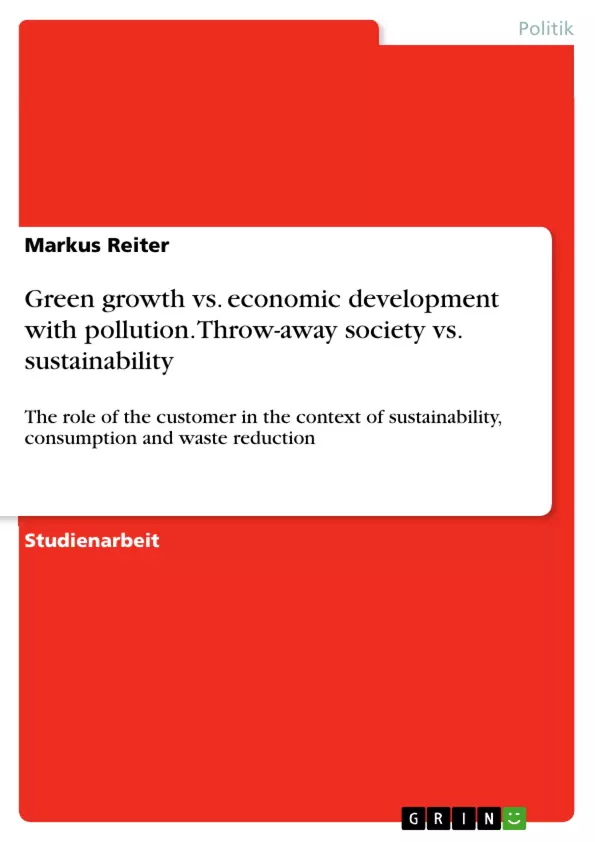This paper will focus on the role of the customer in the context of sustainability, consumption and waste reduction.
Climate change is real and everybody can do something. When thinking about pollution, one might think about the “big polluters” (Griffiths, 2016). And indeed, most of literature focuses on the role of the industry and their impact on climate pollution. But, we cannot deny the fact that the customer should also do something.
We can see the importance of the customer when looking at the economic formula for the equilibrium level of national income: Y = C+ I+ G+ (X-M). The letter C stands for domestic household consumption of goods and services, I stands for domestic real investment, G for government spendings on goods and services and (X-M) stands for exports minus imports of goods and services. This formular represents the aggregate demand function. As we can see in this formular, consumption plays a crucial role in economy.
Another part of facing climate change is to focus on the aspect of sustainability. Figure 1 shows the triangle of sustainability. Sustainability affects economic, environmental and socio-cultural issues. In this theses we would like to combine sustainability and the consumer side of view. The goal of our paper is to analyze the different areas, where goods are consumed and how waste can be reduced in this areas.
Inhaltsverzeichnis
- General Insights in throw-away society and sustainability
- Waste of Clothing
- What is fair fashion?
- Lifecycle of a cotton textile
- Responsibility of the fashion industry
- Ecological
- Health and ethical
- The sustainable lifecycle of a cotton textile – a solution
- Responsibility of the consumer
- Conclusion What can be changed
- Organic food as a solution for sustainable nutrition
- Definition of organic food
- Chances and risks of sustainable nutrition and organic food
- Consumers' motivation for buying organic food
- Recommendations given by BCFN (Barilla Center for food & nutrition)
- Conclusion and recommendations
- Washing
- Detergents - harmful to the environment
- Detergents – historical background and legal specifications
- Environmental responsibilities of companies
- Product types
- Protection of resources
- Water management
- Worth from waste
- Social responsibilities
- Environmental responsibilities of consumers
- Washing at low temperatures but long washing times
- Loading the washing machine right
- Right dosage of detergent
- Labels of environmental friendly products
- Conclusion
- General insights in waste of clothing, food and e-waste
- Waste of Clothing
- Reasons for disposal
- Ways to reduce waste
- Waste of Food
- Reasons for disposal
- Ways to reduce waste
- Waste of electrical and electronic equipment (WEEE)
- Reasons for disposal
- Ways to reduce waste
- Limitations
- Implications and future research
Zielsetzung und Themenschwerpunkte
Diese Studienarbeit befasst sich mit dem Spannungsfeld zwischen Green Growth und wirtschaftlicher Entwicklung mit Umweltverschmutzung. Sie untersucht die Herausforderungen der Wegwerfgesellschaft und die Notwendigkeit einer nachhaltigen Lebensweise. Die Arbeit analysiert verschiedene Aspekte dieses Themas, darunter der Konsum von Kleidung, Lebensmitteln und Elektrogeräten, sowie die Rolle von Unternehmen und Konsumenten bei der Reduzierung von Abfall und der Förderung von Nachhaltigkeit.
- Nachhaltige Konsumgewohnheiten und die Reduzierung von Abfall
- Die Rolle von Unternehmen bei der Förderung von Nachhaltigkeit
- Die Bedeutung von Umweltbewusstsein und Konsumentenverhalten
- Herausforderungen und Chancen für eine nachhaltige Entwicklung
- Green Growth vs. Wirtschaftswachstum mit Umweltverschmutzung
Zusammenfassung der Kapitel
Das erste Kapitel bietet einen allgemeinen Einblick in die Problematik der Wegwerfgesellschaft und die Bedeutung von Nachhaltigkeit. Es beleuchtet die Notwendigkeit eines Umdenkens im Konsumverhalten und die Rolle von Unternehmen bei der Entwicklung nachhaltiger Produkte und Prozesse.
Das zweite Kapitel konzentriert sich auf den Bereich der Bekleidungsindustrie und analysiert den Lebenszyklus eines Baumwolltextils. Es untersucht die ökologischen, gesundheitlichen und ethischen Herausforderungen der Modeindustrie und präsentiert Lösungen für einen nachhaltigeren Umgang mit Kleidung.
Das dritte Kapitel befasst sich mit dem Thema organische Lebensmittel als Lösung für eine nachhaltige Ernährung. Es definiert den Begriff „organisch“, analysiert Chancen und Risiken einer nachhaltigen Ernährung und untersucht die Motivation von Konsumenten beim Kauf von Bio-Produkten.
Das vierte Kapitel widmet sich dem Thema Waschmittel und deren Auswirkungen auf die Umwelt. Es untersucht die historischen Hintergründe und rechtlichen Vorgaben für Waschmittel, analysiert die Umweltverantwortung von Unternehmen und Konsumenten und präsentiert Möglichkeiten zur Reduzierung des Umwelteinflusses von Waschmitteln.
Das fünfte Kapitel bietet einen Überblick über die Abfallproblematik in den Bereichen Kleidung, Lebensmittel und Elektroschrott. Es analysiert die Gründe für die Entstehung von Abfall und präsentiert Möglichkeiten zur Reduzierung von Abfällen in diesen Bereichen.
Schlüsselwörter
Nachhaltigkeit, Green Growth, Wegwerfgesellschaft, Konsumverhalten, Umweltverschmutzung, Abfallreduktion, Modeindustrie, Lebensmittelsicherheit, organische Lebensmittel, Waschmittel, Elektroschrott, Unternehmensethik, Konsumentenverantwortung.
Häufig gestellte Fragen
Was ist der Unterschied zwischen Green Growth und traditioneller Wirtschaftsentwicklung?
Green Growth strebt Wirtschaftswachstum an, das ökologisch nachhaltig ist und Ressourcen schont, während traditionelle Entwicklung oft mit hoher Umweltverschmutzung einhergeht.
Welche Rolle spielt der Konsument bei der Abfallreduzierung?
Konsumenten beeinflussen durch ihr Kaufverhalten (z.B. Bio-Lebensmittel, Fair Fashion) die Nachfrage und tragen durch bewussten Umgang mit Produkten zur Müllvermeidung bei.
Was sind die ökologischen Probleme der „Wegwerfgesellschaft“?
Die Wegwerfgesellschaft führt zu einem übermäßigen Ressourcenverbrauch und riesigen Mengen an Abfall, insbesondere in den Bereichen Textilien, Lebensmittel und Elektronik.
Wie können Unternehmen zu mehr Nachhaltigkeit beitragen?
Unternehmen können nachhaltige Lebenszyklen für Produkte entwickeln, Ressourcen effizienter nutzen und soziale Verantwortung in ihrer Lieferkette übernehmen.
Warum sind Waschmittel ein Umweltproblem?
Viele Inhaltsstoffe von Waschmitteln belasten das Wasser. Nachhaltiges Waschen bei niedrigen Temperaturen und richtige Dosierung helfen, diesen Einfluss zu minimieren.
- Citar trabajo
- Markus Reiter (Autor), 2016, Green growth vs. economic development with pollution. Throw-away society vs. sustainability, Múnich, GRIN Verlag, https://www.grin.com/document/344518



